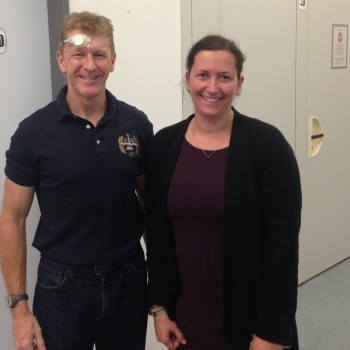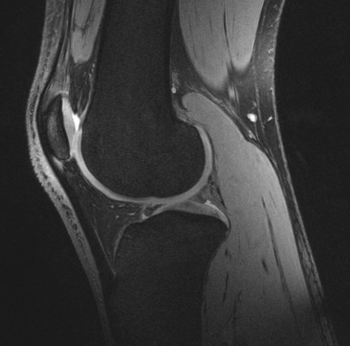
ESA astronaut Tim Peake after giving a blood sample in Cologne, Germany, seen together with Dr Anna-Maria Liphardt, at the Institut für Biomechanik und Orthopädie, Deutsche Sporthochschule Köln. Image credit: A-M Liphardt
ESA astronaut Tim Peake had his knee scanned earlier this week by scientists of the German Sport University Cologne at the Radiology Department of the University Clinic in Cologne, Germany, for the Cartilage study that is looking at astronaut’s cartilage health. Today he had is blood drawn and urine samples stored for the second part of data collection for the study.
Cartilage responds slowly to changes in joint loading as it does not have any blood vessels, lymphatic system or nerves to feed and grow tissue so nutrients are absorbed slowly.
Articular cartilage serves a variety of functions including transferring and distributing forces, and allowing smooth joint movement.
Healthy cartilage is needed for proper joint function, and so basically any physical activity.
How cartilage reacts when patients are bedridden for long periods is barely known. Typically, a change in the biological or mechanical environment of cartilage can lead to osteoarthritis, the wasting away of cartilage. Cartilage morphology and biology may be indicative of degenerative processes of cartilage for example when it degrades and becomes thinner.
This research project will test if a stay in space decreases the volume and thickness of the cartilage and affect the metabolism of the tissue.
Experiment setup
Aside from the MRI scan of Tim’s knee taken earlier, he will have several scans in the first month after he returns to Earth and again a year after his mission. In addition researchers measure the molecular fragments of cartilage components in Tim’s blood and urine.
Yesterday, they drew Tim’s blood and this will be repeated on the same schedule as the MRI scan of his knee.
Tim is the eighth astronaut to take part with a total of 10 to complete the study.


Discussion: one comment
Is it possible Tim’s knee joint will expand or perhaps becomes “longer” due to zero gravity conditions? Interesting read.